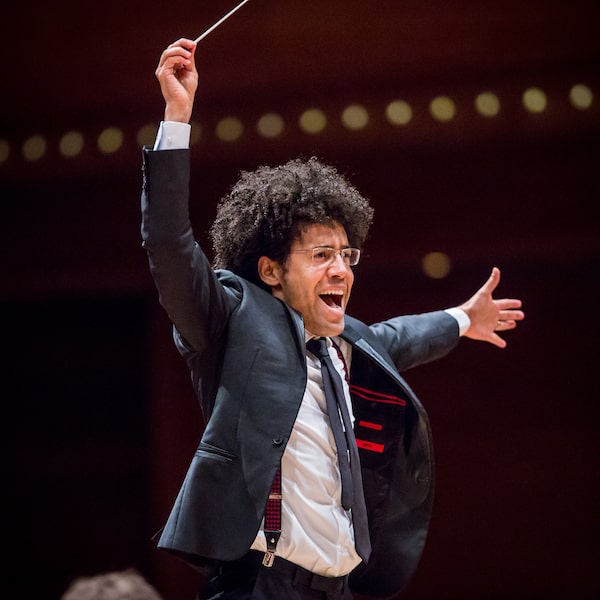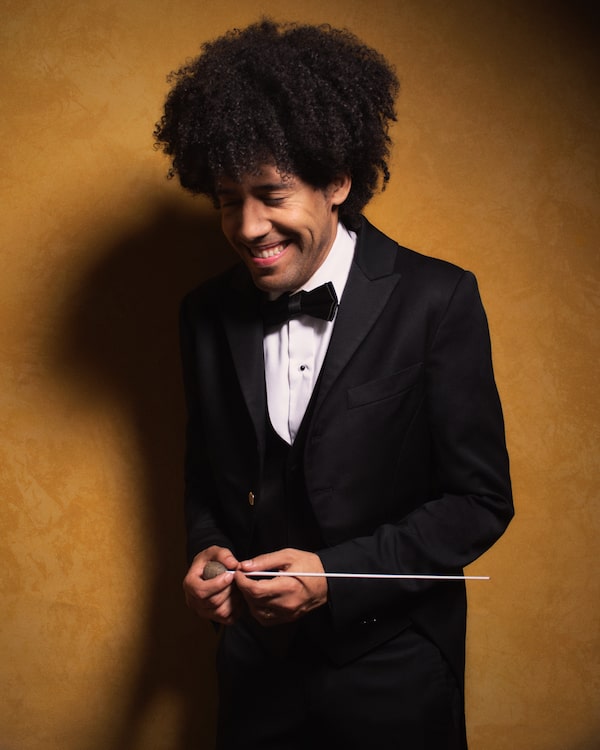
Rafael Payare, conductor and Montreal Symphony Orchestra music director.Antoine Saito
Rafael Payare likes food metaphors, especially when explaining the finer points of programming. “Sometimes you need the right appetizer and a good aperitif before you eat other things,” he says. “It sets up your palate.”
The Venezuela-born maestro has officially been music director of the Orchestre symphonique de Montréal since September, 2022, but has already embarked on two tours with the orchestra: to Europe last fall, and to the United States recently.
Programs for respective tours were a tasty mix, showcasing the work of Canadian composer Samy Moussa alongside that of Ravel and Shostakovich, and U.S.-born, Canada-based composer Dorothy Chang’s music with Bartók, and Mahler. The textures and sonorities of each work reflect Payare’s taste for complementary variation.
A graduate of Venezuela’s famous El Sistema program, Payare played solo horn in the Simon Bolivar Orchestra under the baton of fellow Sistema graduate/conductor Gustavo Dudamel. In 2012, Payare won first prize at Denmark’s Malko International Conducting Competition and went on to assist conductors Claudio Abbado, Lorin Maazel and Daniel Barenboim.
He also worked in opera (at the Glyndebourne Festival and Royal Swedish Opera) and led a number of venerable orchestras, including the Chicago Symphony, the Cleveland Orchestra, the Vienna Philharmonic and the London Symphony Orchestra.
Along with his current position in Montreal, Payare is in his fourth season as music director of the San Diego Symphony, and holds positions as principal conductor of Virginia’s Castleton Festival and conductor laureate of Northern Ireland’s Ulster Orchestra, where he previously served as principal conductor and music director.

The Venezuela-born maestro’s star has risen quickly, a fact that has not gone unnoticed in the often overhyped world of classical music.
“Electrifying” is a word frequently used to describe Payare’s energetic live performances. At his debut leading the New York Philharmonic last December, the New Criterion observed that Payare exuded leadership, and “seemed connected to the music – physically, kinetically.”
His handling of the Royal Opera House Covent Garden’s presentation of The Barber of Seville in February (another debut) inspired similar praise, with The Times noting Payare imbued an abundance of “energy and pace” into Rossini’s bubbly score, and The Guardian highlighting his “nimbly sprung rhythms crisp as an iceberg lettuce.”
Payare’s star has risen quickly, a fact that has not gone unnoticed in the often overhyped world of classical music.
But the hype belies a musicality that extends beyond the podium and into one of a music director’s main areas of responsibility: programming.
Often fraught with challenges, the design of an orchestral season demands careful negotiation between the realities of funding, the challenges of dwindling audiences and louder, more frequent calls for diversity as applied to music, personnel and soloists.
Contemporary music is often tacked onto the front of programs as a kind of medicine meant to imply an organizational commitment to modernity; the complementary nature of such medicine is not consistently prioritized, which often results in new and/or unknown works being performed once and forgotten.
Payare hopes for a different path. “It’s very important to program things that don’t just check a box,” he says. Medicine and appetizers are, after all, two very different things.
“There are many different composers out there, and it’s important to bring them in not just as tiny canapé, but as part of a proper meal. Sometimes they are the protein, sometimes they are a good appetizer – sometimes they are the main dish.”
In Montreal, a feast of music from the Americas will be on offer in April, with the OSM presenting a series of concerts featuring Venezuelan artists as well as cellist Alisa Weilerstein, Payare’s real-life wife. (”We are wired the same way when it comes to making music,” he says.)
One concert series will feature Richard Strauss’s 1897 symphonic poem Don Quixote, a world premiere by Quebec-based composer Ana Sokolovic and the 1954 work Cantata Criolla by Venezuelan composer Antonio Estevez. Based on a Venezuelan mythic poem, Payare says Estevez’s work is “one of the most important oratorios in all of Latin America. Every single season it’s important to have something like this.”
Programming, often done years in advance because of schedules and artist availability, ought not to confine itself to one idea or concept, Payare believes, but should be driven by creativity within a framework that opens ears and drives curiosity. “It’s important for audiences to eat a new kind of dish.” He pauses, then quickly adds, “I’m not hungry but I like the food metaphors.”
A musical meal music fans can enjoy at home is Payare’s OSM recording of Mahler’s Fifth Symphony, released in early March via Dutch label Pentatone. Payare believes the work, written at the beginning of the 20th century, marks a turning point in Mahler’s creative evolution and acts as a doorway between the composer’s epic and intimate writing styles.
The recording could also be considered a portal for Payare and the OSM. In the discussions leading up to Payare’s appointment (announced in early 2021), there was mention of “things the orchestra has done and not done in 30 years, and I saw Mahler was one of the composers not as present.” Mahler opened the OSM’s current season and will close it in June.
Between then and now, Payare’s schedule is full, with coming appearances in Munich, Cleveland, Los Angeles, San Diego and Montreal. How does he maintain the energy? “It’s the music – it gives you so much, it leaves you full.”
After so many metaphors, it seems appropriate to ask: Does Payare cook?
“No, I eat,” he says, a smile creeping across his face. “To say I cook would be a lie.”